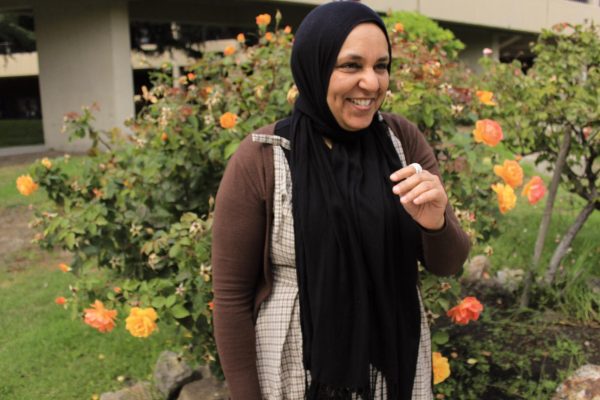
Romi Bales
Mina Spasely, peer mentor for SALAAM learning community and nursing major at College of Alameda, poses in front of the sign for the college. SALAAM aims to uplift CoA students from Arab, Southwest Asian and North African diasporic communities.
Mina Spasely knows how difficult it is for Afghan women to get an education.
“Since my country [was taken] over by Taliban,” she said, it’s been “almost four years [that] girls are banned from school […] They are not allowed to go to university, to school, to any institute.”
Spasely is an immigrant from Afghanistan, and she currently studies nursing at College of Alameda (CoA). She said those social and political barriers persist in the lives of women like her, even after immigration. “They are still busy with their kids,” Spasely said. “They [don’t] know how to start college.”
This is why she became a peer mentor at CoA’s SALAAM program, a learning community that aims to uplift Arab, Southwest Asian and North African students.
Any CoA student can join SALAAM. It is funded through a state grant for the college’s Equal Opportunity Programs and Services (EOPS) program.
Through SALAAM, students in need can receive classroom materials, food vouchers, assistance with transportation costs, early access to class registration, and more. But co-founder Fathia Mohamed has seen her work hold a special significance for women.
“There’s no other hijabi counselor,” Mohamed said. “SALAAM students, who are mostly female, they notice this and they say, ‘Oh, wow, she looks like us, that’s a good sign.’”

Mohamed established SALAAM together with the college’s EOPS Project Manager, Louie Martirez y McFarland, during the Spring 2022 semester.
The program started with an inaugural class of 50 students. According to both founders, SALAAM continues to grow with a current headcount of between 70 and 100 students.
Martirez y McFarland said that he noticed “a huge population” of Southwest Asian and North African students among the EOPS cohort at the college when he began working there, and that many of those students were women. But the college lacked a learning community for them, akin to Umoja or Puente.
In addition to materials, grants, and food vouchers, Mohamed said SALAAM also supplies a safe community for students to land in. She said that former SALAAM students often “[tell] their uncles and aunts, anybody, ‘Come to College of Alameda.’” However, she added, “many of them will say, ‘Well, I don’t speak English.’”
So her team works closely with the ESOL department to reduce the language barrier around the career opportunities that CoA offers. “I help try to translate for [students,] to explain to them how to apply for EOPS,” Mohamed said.
According to Mohamed, many of SALAAM’s students have gone on to become dental assistants, diesel mechanics, engineers and pre-med students.
“They can go anywhere they want,” she said. “They can attend college. They can achieve their goals. They can graduate.”
Hala Albitar, a SALAAM peer mentor and apparel design and merchandising major, expects to graduate next year. She said that the program has helped her build community while pursuing her degree.
“We sometimes have celebrations for Ramadan or after that, we have an Eid celebration,” Albitar said. “We visited UC Berkeley and [UC Santa Cruz] and that gave us a lot of energy to graduate and transfer.”
SALAAM peer mentor Spasely said that everything she does is “for all Afghan girls, those who are not allowed to go to school.” Her work revolves around connecting students with the resources and opportunities they need to be successful in higher education.
“Whenever I go for a walk with my kids, whenever I go in a park and I see the [women,] I always encourage them,” Spasely said. “Please come. I’m here.”
The SALAAM learning community is based in CoA’s A Building, inside the EOPS office. The office is open to students Monday through Friday from 8 a.m. to 4:30 p.m.